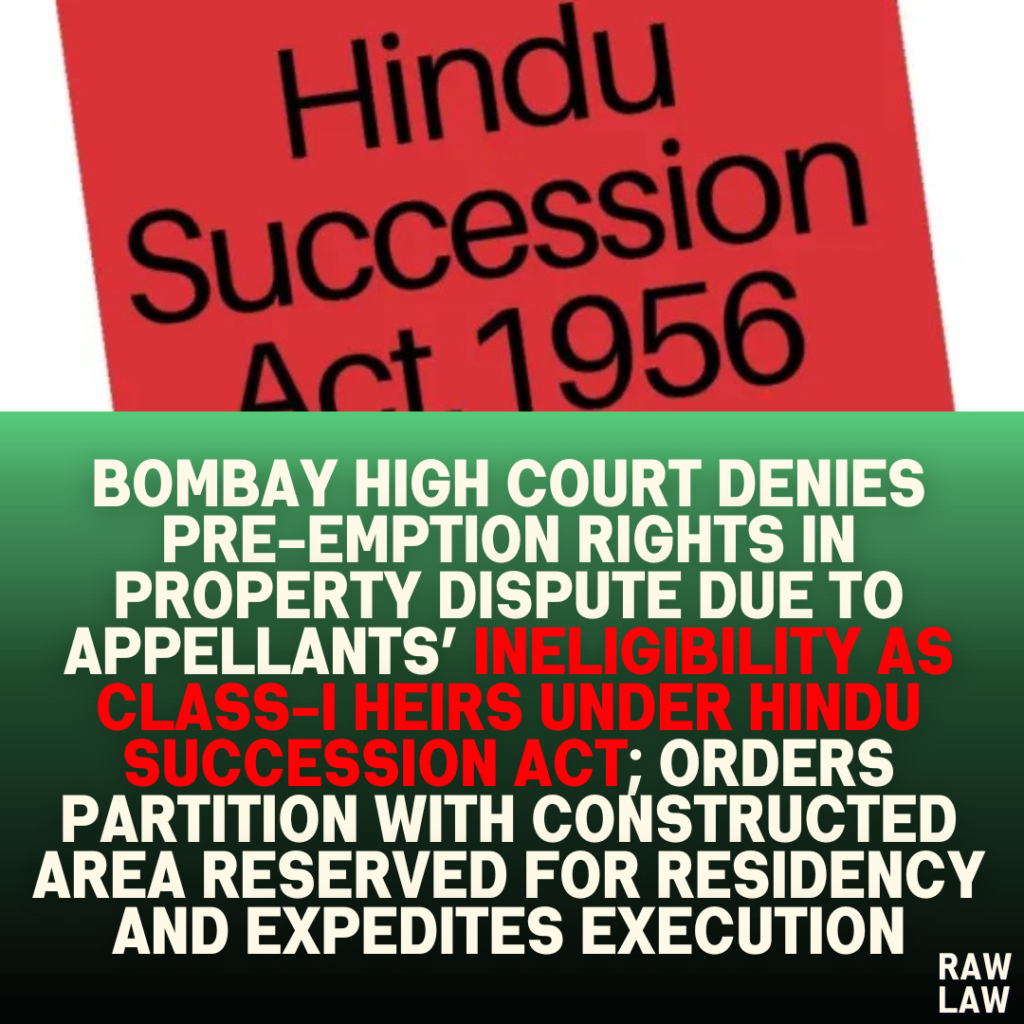Court’s Decision:
The Bombay High Court dismissed the appeal, affirming the lower courts’ decisions that the appellants have no right to pre-emption in the suit property, as they are not Class-I heirs under Section 22 of the Hindu Succession Act, 1956, which applies only to male intestate property. Additionally, the court granted the respondents’ counterclaim for partition and directed the executing court to expedite the partition within six months.
Facts:
- The dispute centers on a property originally owned by a Hindu woman, Sushilabai, who died intestate.
- The appellants sought pre-emption rights to purchase the shares of the respondent co-heirs, invoking Section 22 of the Hindu Succession Act, which grants co-heirs a preferential right to purchase each other’s shares to prevent outsider acquisition.
- Sushilabai’s son had sold his 1/4th share of the property to third-party respondents, which the appellants challenged, claiming a right to pre-empt the sale.
Issues:
- Whether the appellants are entitled to a right of pre-emption under Section 22 of the Hindu Succession Act, given the property’s origin and inheritance structure.
- Whether the counterclaim for partition is maintainable despite the sale of an undivided share.
- Whether Section 4 of the Partition Act, 1893, applies to provide a right of pre-emption under these circumstances.
Petitioner’s Arguments:
The appellants argued that:
- They had a statutory right of pre-emption under Section 22, as the property originally belonged to their family.
- The sale to third-party respondents violated family unity principles.
- The respondents did not adequately offer the property for sale to the appellants before transferring shares to outsiders.
Respondent’s Arguments:
The respondents contended that:
- The appellants are not Class-I heirs of Sushilabai under the Act’s Schedule, thus lacking standing for pre-emption.
- The property devolved through testamentary succession rather than intestate succession.
- The appellants failed to prove willingness and financial capability to buy the property shares when offers were previously made.
Analysis of the Law:
The court analyzed the provisions of the Hindu Succession Act, specifically Sections 22, 14(1), and the applicability of Class-I heir conditions. It ruled that:
- Section 22’s pre-emption right is confined to property inherited by Class-I heirs of Hindu males.
- Sushilabai’s intestate status invoked Section 15, not Section 8, of the Act, thereby excluding the appellants from claiming Class-I heir status.
Precedent Analysis:
The court referred to the precedent established in Gurnam Singh v. Lehna Singh, which holds that appellate courts should not interfere in findings without substantial error. Citing Shyam Sunder v. Ram Kumar and other cases on pre-emption rights, it noted these cases were inapplicable here, as they pertain to properties governed by male intestate succession.
Court’s Reasoning:
The court reasoned that:
- Section 22’s pre-emption rights are inapplicable as the appellants do not qualify as Class-I heirs.
- The Partition Act’s Section 4 also did not apply, as no general suit for partition was filed by third-party purchasers.
- The appellants’ silence and lack of financial demonstration further nullified their pre-emption claims.
Conclusion:
The appeal was dismissed, and the court ordered an expedited partition, specifying that the appellants would retain the constructed area for residency and the remaining land would be partitioned for the respondents. Execution was directed to conclude within six months.
Implications:
This judgment clarifies the strict applicability of Section 22 of the Hindu Succession Act to only male intestate property, affirming that pre-emption rights are not extended to female intestate properties under the Act’s current framework.




Pingback: Gauhati High Court Dismisses Appeal for Specific Performance Due to Appellants' Failure to Establish Continuous Readiness and Willingness Within Stipulated Period - Raw Law
Hi to every one, the contents present at this website are truly amazing for people knowledge,
well, keep up the good work fellows.
Hey I know this is off topic but I was wondering if you knew of any widgets I could add
to my blog that automatically tweet my newest twitter updates.
I’ve been looking for a plug-in like this for quite some time and was hoping maybe you would have some experience with something like this.
Please let me know if you run into anything. I truly enjoy reading your blog
and I look forward to your new updates.
hello there and thank you for your information – I’ve definitely picked up anything
new from right here. I did however expertise a few technical points
using this web site, as I experienced to reload the web site a lot of times previous to I could get it to load properly.
I had been wondering if your web host is OK? Not that
I’m complaining, but sluggish loading instances times
will very frequently affect your placement in google and can damage your high-quality score if ads and marketing with Adwords.
Anyway I’m adding this RSS to my e-mail and could look out for much more
of your respective fascinating content. Make sure you update this again very soon.